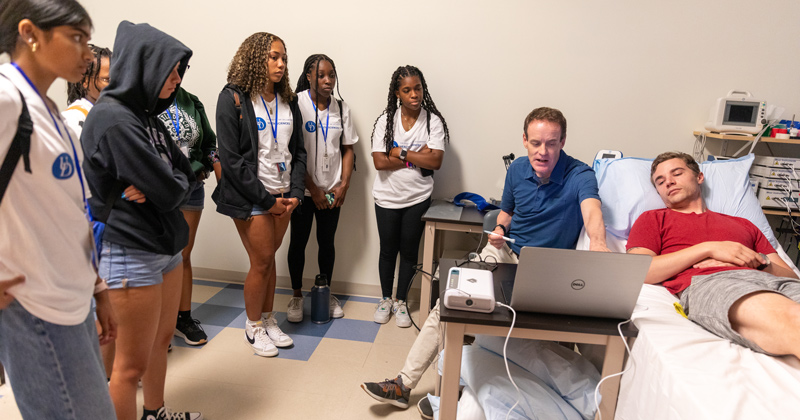


New Esterly Chair
Photos by Ashley Barnas July 05, 2023
Dave Edwards named Unidel Katherine L. Esterly Chair in Health Sciences
Dave Edwards, professor and new chair of the Department of Kinesiology and Applied Physiology in the University of Delaware’s College of Health Sciences, and leading expert in cardiovascular research, has been named the Unidel Katherine L. Esterly Chair in Health Sciences.
The Unidel Chair in Health Sciences is named for the late Dr. Katherine L. “Kitty” Esterly, a pioneer in neonatology in Delaware and recipient of the University’s Medal of Distinction.

According to the World Health Organization, cardiovascular diseases are the leading cause of death globally. Edwards is responsible for the creation of the University of Delaware Center of Biomedical Research Excellence (COBRE) in Cardiovascular Health, which now in its eighth year of funding from the National Institutes of Health, has helped grow cardiovascular health-related research at UD.
“Dr. Edwards is an outstanding scholar who is deeply engaged in addressing a critically important health challenge not only in Delaware but our entire nation and the world,” said UD President Dennis Assanis. “Such public-serving research and scholarship are hallmarks of UD, and they are essential in advancing our institution’s land-grant mission, so Dr. Edwards is truly deserving of this recognition.”
Provost Laura Carlson added, “His research, teaching and commitment to serving our community make him an invaluable member of the UD faculty, and we are proud to support his scholarship with this chair, which is generously supported by the Unidel Foundation.”
William B. Farquhar, Dean of the College of Health Sciences, said the Esterly Chair in Health Sciences honor reflects Edwards’ commitment to improving cardiovascular health in Delaware.
“Dr. Edwards is an exemplary leader with an impressive, interdisciplinary research portfolio who's dedicated to advancing education and health,” Farquhar said. “It’s for these reasons, I’m thrilled Dave will become the next Esterly Chair in Health Sciences and will simultaneously lead the growing Department of Kinesiology and Applied Physiology. This is a well-deserved honor for one of our most productive faculty dedicated to student and faculty development.”
Edwards, who obtained his bachelor’s degree in physical education studies from UD in 1991 and went on to get his master’s and doctorate, has dedicated his career to cardiovascular health and called working in cardiac rehabilitation an important piece of his training.
“I saw the beneficial effects of exercise on cardiovascular health and quality of life,” he said. “It got me very interested in continuing to understand exercise and cardiovascular and exercise physiology.”
His interest in cardiovascular-related research led to the establishment of the COBRE in Cardiovascular Health in 2016. The center is now in its second, five-year phase of NIH funding. Edwards and other faculty in the center provide comprehensive mentoring to new investigators in the center.
“The center’s goal is to improve cardiovascular health by supporting multidisciplinary research and funding promising investigators so they can get larger independent grants to advance their work,” Edwards said. “Some successes we’ve supported in the past include investigating the impacts of sleep on cardiovascular health, the interaction between potassium and sodium on the vasculature, women’s cardiovascular health, and the cardiovascular consequences of Duchenne muscular dystrophy.
“These investigators have been successful in transitioning to larger independent grants to continue their work and impact cardiovascular health in those areas.”
Research in Edwards’ lab led to the creation of UD’s Renal Rehab, which combats chronic kidney disease with exercise, filling a gap in the community.
“Patients with chronic kidney disease are at an increased risk for cardiovascular disease over and above what you would expect based on traditional risk factors,” Edwards. said. “We had an NIH grant to conduct an exercise training study to determine the impact of exercise on cardiovascular function and exercise capacity in those patients, and that led to the creation of the Renal Rehab program.”
The program continues today, led by Brittany Overstreet and the master’s students in the clinical exercise physiology program with referrals from physicians and nurses in nephrology.
“It was rewarding to translate our research into an ongoing program that’s having an impact on the community,” Edwards said.
Edwards’ research into chronic kidney disease also continues to expand.
“We’ve done a good bit of work investigating vascular function in kidney disease and are starting to move towards brain health because patients with chronic kidney disease often have some cognitive issues that are likely related to renal function but are also related to poor cardiovascular health,” Edwards said. “We’re hoping to better understand the link between cardiovascular function and brain health in these patients and the potential role of exercise training.”
Edwards is also collaborating with Farquhar on research that has revealed sodium affects more than just blood pressure. The average American consumes 3,400 milligrams of salt daily, well above the 2,300 milligram recommendation in the Dietary Guidelines for Americans. Excess sodium consumption and its impacts on cardiovascular function are at the center of research in Edwards’ Vascular Physiology Research Laboratory.
“Typically, the health concern related to dietary salt is due to an increase in blood pressure but in young people whose blood pressure doesn’t change on a high-salt diet, we have found that blood vessel function is impaired by high salt,” Edwards said. “That’s a potential early step in the development of cardiovascular disease down the road.”
Individuals who habitually consume a high-salt diet are being counseled to reduce their intake to the recommended level for one month. The participant’s cardiac and vascular function is assessed pre- and post-counseling.
“There are many other potential areas to explore,” Edwards said. “We’re also examining how impairments in vascular function due to dietary sodium may impact the arterial load on the heart.”
In addition to being named the Esterly Chair of Health Sciences, Edwards was also named chair of the KAAP Department effective July 1. Over the past 18 years, he’s watched the department grow and flourish.
“We have outstanding faculty with impactful research programs and a commitment to teaching,” Edwards said. “We continue to focus on excellent experiences for our undergraduate and graduate students.”
Contact Us
Have a UDaily story idea?
Contact us at ocm@udel.edu
Members of the press
Contact us at 302-831-NEWS or visit the Media Relations website

